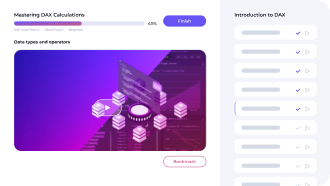Introduction to Statistics for Data Analysts
Navigate data uncertainty with our practical guide. Learn to recognize, understand, and manage it effectively to make smarter decisions.
Trusted by 220,000+ people worldwide.
An outline of this training course
Real world data is frequently ambiguous, and often it’s not obvious whether a visible trend represents an important phenomenon or just random noise.
In this course, we build practical understanding of the most important statistical tools used to differentiate the one from the other, whether the data is quantitative or categorical. Very little theory is presented; rather, the focus is on selecting appropriate tools and correctly interpreting the results.
The inability to recognize and manage uncertainty is a common cause of erroneous conclusions in data analysis. Being able to avoid such errors in one's own practice and to recognize them in others' is an essential skill for anyone working with data.
What are needed to take this course
Participants of this course must have basic knowledge and understanding of variable types, descriptive and inferential statistics. No other advanced preparation is needed to take this course.
Although the demonstrations in the course are done in R, they are intended to be generalizable to Python or any other statistical software you choose to use. Knowledge of R is not a prerequisite for taking this course.
Who is this course for
Anyone working with data and attempting to draw constructive, generalizable conclusions from data
Details of what you will learn during this course
By the end of the course, learners will:
- Have strong intuition into variability and bias in real-world sample data
- Understand the fundamental logic of statistical inference
- Possess a toolkit of essential techniques for analyzing categorical and quantitative variables
- Recognize statistical abuse and be able to avoid it in practice
- Be prepared to quickly learn any of the various specialized inference techniques they might encounter in their future work with data
What you get with the course
- An hour and a half of self-paced video training
- Resource pack that includes data source files and R scripts
- One final assessment
Program Level
Intermediate
Field(s) of Study
Statistics
Instruction Delivery Method
QAS Self-study
***This course was last updated in January 2023
Enterprise DNA is registered with the National Association of State Boards of Accountancy (NASBA) as a sponsor of continuing professional education on the National Registry of CPE Sponsors. State boards of accountancy have final authority on the acceptance of individual courses for CPE credit. Complaints regarding registered sponsors may be submitted to the National Registry of CPE Sponsors through its website: www.nasbaregistry.org
What our
Students Say
Curriculum
Course Overview
Resources
Introduction
Confidence Intervals
Significance Testing
Statistical Use Misuse and Abuse
Proportions
Goodness of Fit
Sample Size and Power
Course Wrap Up
Quiz
Your Feedback
Certification
Continuous Learning
Your
Instructor
Andrew Gard
Enterprise DNA Expert
- Creator of the popular YouTube channel, Equitable Equations, which teaches practical statistics, data science, and R programming
- Professor of mathematics and computer science at Lake Forest College, located near Chicago, USA
- Author of the R package fqar, which facilitates the analysis of large floristic quality data sets
- PhD in mathematics from The Ohio State University
- Area of specialization: data analysis with R. I integrate both domain expertise and technical data science to provide deep answers to real-world data questions while respecting and quantifying the uncertainty inherent in the data.
Frequently Asked
Questions
What’s the difference between a free account and a paid plan?
Do I need to know anything about data science or data analytics to get started with Enterprise DNA?
How will I be charged?
Can I get an invoice for my company?
Are refunds available?
Will AI take over the world and make data skills worthless?
Recommended
Courses

Integration, Analytics, and Governance for MS Fabric

Data Management and Processing in Microsoft Fabric

Foundations of Microsoft Fabric
Get full access to unparalleled
training & skill-building resources

FOR INDIVIDUALS
Enterprise DNA
For Individuals
Empowering the most valuable data analysts to expand their analytical thinking and insight generation possibilities.
Learn MoreFOR BUSINESS
Enterprise DNA
For Business
Training, tools, and guidance to unify and upskill the data analysts in your workplace.
Learn More




